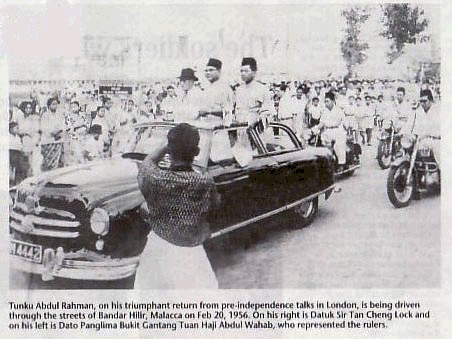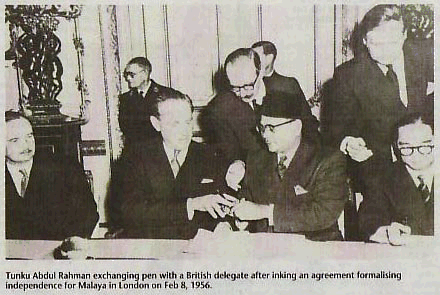Proud to call this land home
Dato' Dzulkifli Abd Razak
Article
The New Sunday Times - 08/26/2007
To the youth of this country I have a message.
You have a wonderful future ahead of you.
Unlike us, you have a country free from any domination.
You grow up with your heads held high as masters in your own country.
As masters you have the privileges as well as your duties and responsibilities.
The future of this country rests on you: whether our star rises or falls, it will be due to you solely.
Therefore, be ready to serve her, to build her up and to give your life in her defence.
You and I must be determined to make Malaya a place which we shall
all be proud to call home.
We have therefore a role to play and let us play it well.
—Tunku Abdul Rahman
(Excerpts from his speech made a day before he declared Merdeka)
FIFTY years on and message is still very much alive today, especially when there are amongst us who take for granted that we are forever "free from any domination".
While this may appear to be true physically and to a large extent materially, it may not be necessarily so, mentally and culturally.
Article
The New Sunday Times - 08/26/2007
To the youth of this country I have a message.
You have a wonderful future ahead of you.
Unlike us, you have a country free from any domination.
You grow up with your heads held high as masters in your own country.
As masters you have the privileges as well as your duties and responsibilities.
The future of this country rests on you: whether our star rises or falls, it will be due to you solely.
Therefore, be ready to serve her, to build her up and to give your life in her defence.
You and I must be determined to make Malaya a place which we shall
all be proud to call home.
We have therefore a role to play and let us play it well.
—Tunku Abdul Rahman
(Excerpts from his speech made a day before he declared Merdeka)
FIFTY years on and message is still very much alive today, especially when there are amongst us who take for granted that we are forever "free from any domination".
While this may appear to be true physically and to a large extent materially, it may not be necessarily so, mentally and culturally.

Our thinking process and behaviour may still resemble that of the colonists in many subtle ways.
Harvard's Kennedy School dean, Professor Joseph Nye, used the word "soft power" to describe this phenomenon of "co-opting people rather than coercing
them".
Compared to "hard power," involving the use of expensive weapons systems, soft power is insidious.
Since soft power is largely based on intangible or indirect influences such as ideas, culture and values, many can be unknowingly "colonised".
And it is in this context that the words of the first Prime Minister continue to be a useful reminder to the current and future generation of youths.

He is categorical about our role towards our country—our readiness to serve, to build and even to defend her with our lives so that we shall all be proud to call home.
The future of Malaysia indeed rests solely on all of us. And rightly, unless we play our role, and play it well, we do not stand a chance!
A more recent reminder as to what this means could be gleaned from the keynote address of Raja Dr Nazrin Shah of Perak during the Young Malaysians' Roundtable Discussion in relation to nation building, on April 3.
He suggested that in order to play a meaningful role, youths must be exposed to more than just abstract concepts.
He was also forthright in asserting that good and upright leadership must be demonstrated; also taught and observed at work.
Those who are found to be able must be mentored by those who are capable so that success can be learned and replicated.
Finally, the young must be given responsibilities they can handle. Making mistakes should be part of their overall learning process.
As a brief footnote, Raja Nazrin highlighted "that nation building is a heated and even hated notion in some parts of the world".
"The main reasons for this are, first, that it is taking place in the midst of great domestic turmoil, and, second, that it is primarily initiated and managed by foreign powers.
"Trying to cobble a functioning state by papering over deep social and political rifts is, of course, easier said than done.
"History has shown us time and again, that it is much easier to break down, rather than build up, nations."
It is for this reason alone, that the pledge to play our role as Malaysian citizens and play it well is uncompromising as the late Tunku insisted.
To this, Raja Nazrin adds that failure is a costly option.
Mindful of such consequences, the Tunku in another speech made after arriving from London on June 3,1957, on record said:
"The eyes of the world will be upon us. The world wants to know how the people of Malaya (Malaysia) will take their first steps as a new nation.
" What will the people of Malaya do? You must therefore all behave well so that the world can speak with approval about the situation.
"I myself believe that Malaya will become a prosperous, peaceful and happy nation receiving assistance, support and service from all races loyal to this country."
In the same speech, he too noted that Malays, Chinese, Indians and other races that wish to be loyal, live together, defend the nation and work together, live in harmony, because the situation in this country is different from other countries in the world.
"Because of this, one race cannot take everything for itself. In order to set up an independent government we must compromise and make sacrifices.
"These sacrifices will enable us to establish a nation which is an example to the world of how all races can live together in friendship."
Most definitely, compromises, sacrifices, and loyalty are among the three vital ingredients that turn Malaysia as the most viable, if not envious, pluralistic in the world.
One without the other, however, can spell disaster for all of us. Here, Raja Nazrin during an even more recent address, in early August, at a book launch on the late Tun Dr Ismail Abdul Rahman, spoke of the need for Malaysians to thread carefully.
On these issues, he stressed that the present generation of Malaysians were reaping from the seeds sown by past leaders like Dr Ismail at a time when the country had only one university.
Although the country then had limited intellectual resources, it succeeded because of its leaders who were full of integrity in their struggles, their steadfastness to principles and allegiance to their communities and country.
The early leaders of the nation exhibited high level of unquestionable integrity and loyalty to their principles and country, observed Raja Nazrin.
In the same breath, he called that the loyalty of the people towards their leaders should not be betrayed by the leaders' misconduct and greed.
These eloquent articulations by Raja Nazrin in particular are the voice of reason and the conscience of the country that rings loud and clear as we proudly paced toward the 50th celebration of nationhood this week.
It serves as a reminder to all as we look ahead to the future as citizens of an independent nation.
The future of Malaysia indeed rests solely on all of us. And rightly, unless we play our role, and play it well, we do not stand a chance!
A more recent reminder as to what this means could be gleaned from the keynote address of Raja Dr Nazrin Shah of Perak during the Young Malaysians' Roundtable Discussion in relation to nation building, on April 3.
He suggested that in order to play a meaningful role, youths must be exposed to more than just abstract concepts.
He was also forthright in asserting that good and upright leadership must be demonstrated; also taught and observed at work.
Those who are found to be able must be mentored by those who are capable so that success can be learned and replicated.
Finally, the young must be given responsibilities they can handle. Making mistakes should be part of their overall learning process.
As a brief footnote, Raja Nazrin highlighted "that nation building is a heated and even hated notion in some parts of the world".
"The main reasons for this are, first, that it is taking place in the midst of great domestic turmoil, and, second, that it is primarily initiated and managed by foreign powers.
"Trying to cobble a functioning state by papering over deep social and political rifts is, of course, easier said than done.
"History has shown us time and again, that it is much easier to break down, rather than build up, nations."
It is for this reason alone, that the pledge to play our role as Malaysian citizens and play it well is uncompromising as the late Tunku insisted.
To this, Raja Nazrin adds that failure is a costly option.
Mindful of such consequences, the Tunku in another speech made after arriving from London on June 3,1957, on record said:
"The eyes of the world will be upon us. The world wants to know how the people of Malaya (Malaysia) will take their first steps as a new nation.
" What will the people of Malaya do? You must therefore all behave well so that the world can speak with approval about the situation.
"I myself believe that Malaya will become a prosperous, peaceful and happy nation receiving assistance, support and service from all races loyal to this country."
In the same speech, he too noted that Malays, Chinese, Indians and other races that wish to be loyal, live together, defend the nation and work together, live in harmony, because the situation in this country is different from other countries in the world.
"Because of this, one race cannot take everything for itself. In order to set up an independent government we must compromise and make sacrifices.
"These sacrifices will enable us to establish a nation which is an example to the world of how all races can live together in friendship."
Most definitely, compromises, sacrifices, and loyalty are among the three vital ingredients that turn Malaysia as the most viable, if not envious, pluralistic in the world.
One without the other, however, can spell disaster for all of us. Here, Raja Nazrin during an even more recent address, in early August, at a book launch on the late Tun Dr Ismail Abdul Rahman, spoke of the need for Malaysians to thread carefully.
On these issues, he stressed that the present generation of Malaysians were reaping from the seeds sown by past leaders like Dr Ismail at a time when the country had only one university.
Although the country then had limited intellectual resources, it succeeded because of its leaders who were full of integrity in their struggles, their steadfastness to principles and allegiance to their communities and country.
The early leaders of the nation exhibited high level of unquestionable integrity and loyalty to their principles and country, observed Raja Nazrin.
In the same breath, he called that the loyalty of the people towards their leaders should not be betrayed by the leaders' misconduct and greed.
These eloquent articulations by Raja Nazrin in particular are the voice of reason and the conscience of the country that rings loud and clear as we proudly paced toward the 50th celebration of nationhood this week.
It serves as a reminder to all as we look ahead to the future as citizens of an independent nation.
